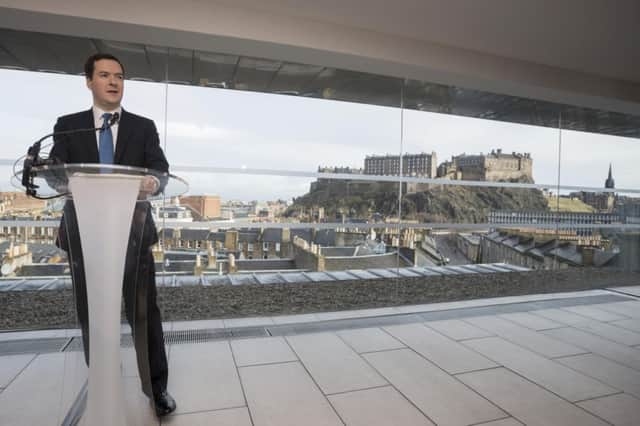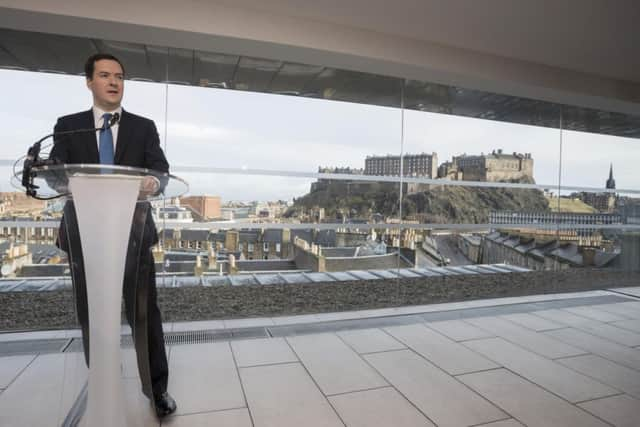SNP under pressure for Plan B on Scottish currency


Business leaders and pro-UK politicians called on Nationalist leaders to come up with a new currency policy, as George Osborne used a speech in Edinburgh to say the SNP’s plan to share the pound would “not work” and was “not going to happen”.
First Minister Alex Salmond dismissed the Chancellor’s statements rejecting a formal currency union as “bluff, bluster and posturing”, while his deputy, Nicola Sturgeon, insisted the SNP would not change its position ahead of the referendum and claimed an independent Scotland “could not be prevented from using the pound”.
Advertisement
Hide AdAdvertisement
Hide AdMr Salmond said the joint move by the Conservatives, Labour and Liberal Democrats was “a concerted bid by a Tory-led Westminster establishment to bully and intimidate”.


In what could be a key moment in the debate over Scotland’s future, Mr Osborne, his Labour shadow Ed Balls and Liberal Democrat Chief Secretary to the Treasury Danny Alexander all declared a formal currency union was “not going to happen”.
The Scottish Government wants to create a “sterling zone’’ with the rest of the UK if there is a Yes vote in the independence referendum.
But Mr Osborne said: “If Scotland walks away from the UK, it walks away from the UK pound.”
He added: “The SNP says that if Scotland becomes independent, there will be a currency union and Scotland will share the pound. People need to know that is not going to happen, because sharing the pound is not in the interests of either the people of Scotland or the rest of the UK.”
Both Mr Balls and Mr Alexander also made clear they would not sign up to a formal currency union if Scots voted in favour of leaving the UK on 18 September.
Mr Balls said: “Alex Salmond is saying to people that you can have independence and keep the pound and the Bank of England. That is not going to happen.”
Mr Alexander said it was “crystal clear a currency union would create unacceptable risks both for Scotland and the rest of the United Kingdom”.
Advertisement
Hide AdAdvertisement
Hide AdBut Ms Sturgeon insisted the SNP would not change its position ahead of the referendum.
She said: “We have looked at all of the currency options which would be available to an independent Scotland and, based on the recommendations of the fiscal commission, we believe that a currency union will be the best option for Scotland and for the rest of the UK, and that is the position we will continue to argue because we think it is the right one. So, we will continue and argue the case which we have set out.”
The Scottish Government has previously unveiled its blueprint for retaining the pound if people vote for independence, creating a sterling zone with the rest of the UK. This plan has been endorsed by experts on the Fiscal Commission Working Group, set up by Mr Salmond, which said keeping sterling as the currency in an independent Scotland would be “sensible” and an attractive choice for the rest of the UK.
Yesterday, the First Minister said: “People in Scotland will not be fooled by the bluff, bluster and posturing of Osborne, Ed Balls and Danny Alexander.
“The reality is that a formal currency union with a shared sterling area is overwhelmingly in the rest of the UK’s economic interests following a Yes vote, and the stance of any UK government will be very different the day after a Yes vote to the campaign rhetoric we are hearing now.
“To do otherwise would involve a prospective Westminster chancellor of any party standing on a platform which was not only vastly at odds with majority public opinion across Scotland and the rest of the UK, but would seriously damage the economy of the rest of the UK as it would cost their own businesses hundreds of millions of pounds a year, blow a massive hole in their balance of payments and leave them having to pick up the entirety of UK debt.”
On the issue of an independent Scotland’s share of UK debt, the First Minister said: “All the debt accrued up to the point of independence belongs legally to the Treasury, as they confirmed last month, and Scotland can’t default on debt that’s not legally ours.
“However, we’ve always taken the fair and reasonable position that Scotland should meet a fair share of the costs of that debt. But assets and liabilities go hand in hand and, contrary to the assertions today, sterling and the Bank of England are clearly shared UK assets.”
Advertisement
Hide AdAdvertisement
Hide AdAnti-independence campaigners suggested a decision to use the pound outside a formal currency zone would mean Scotland facing similar problems to nations such as Panama, which uses the American dollar without US co-operation.
Alistair Darling, the leader of the No campaign, said yesterday’s interventions had left Mr Salmond with “no plan for currency in an independent Scotland”, as he called on SNP ministers to set out alternative plans.
Mr Darling, an Edinburgh MP and former Labour chancellor, said: “It is now clear beyond any doubt: the only way to keep the pound is for Scotland to remain in the UK.
“People need to know that when they go into a polling station in September, they will be voting either to keep the pound or ditch the pound.
“A vote to leave the UK is a vote to lose the pound. The SNP government have ruled out using the pound without agreement, in the way Panama uses the dollar. So what money will Scotland use?
“What we need now from the SNP isn’t so much a Plan B, but a Plan A. Now that using the pound is off the table, would we be rushing to join the euro or set up an unproven separate currency?”
Liz Cameron, chief executive of the Scottish Chambers of Commerce, said the currency issue was key for businesses, pointing out the rest of the UK was the “dominant market” for Scottish exports, with £47 billion of goods and services going south of the Border each year.
She said the Chancellor’s “clarification of the UK government’s stance is extremely useful to businesses as they approach the referendum”.
Advertisement
Hide AdAdvertisement
Hide AdShe added that Mr Osborne’s statement “does, of course, raise the importance of the consideration of alternative models for currency in an independent Scotland and scrutiny of how these may impact businesses in the future”.
The Chancellor came to Edinburgh weeks after Bank of England governor Mark Carney warned Mr Salmond’s plans to retain the pound in a currency union with the UK would mean the loss of key powers for an independent Scotland.
Mr Osborne said it “would be impossible to construct an acceptable banking union” between an independent Scotland and the rest of the UK, as any such deal would “involve putting UK taxpayers on the line for banks in a foreign country”.
He said the SNP plans would mean the UK might have to step in to bail out Scottish banks, with “little prospect of any benefit flowing in the other direction, for Scotland could only make a limited contribution to supporting a big English bank”.
No deal on more powers for Holyrood before referendum, says Tory leader
The pro-Union parties will not strike a deal on more powers for Holyrood before the independence referendum, Scottish Conservative leader Ruth Davidson said last night.
But she indicated her party wanted to see more powers devolved to the Scottish Parliament to make Holyrood more “accountable” to ordinary Scots.
In a speech to the David Hume Institute in Edinburgh last night, Ms Davidson said the prospect of Labour, the Tories and Liberal Democrats coming up with a joint agreement on more powers before the vote in September was unlikely.
Advertisement
Hide AdAdvertisement
Hide Ad“I don’t believe that there will be a detailed cross-party agreement before the referendum,” she said. “None of the parties have ever said they would want to do that.”
Tory peer Lord Strathclyde is carrying out a review into more powers for Holyrood and will report his findings in May.
Ms Davidson told her audience that devolving more powers to Holyrood was not about “buying off the Nats”, insisting the Tories wanted “responsibility and accountability to be at the heart of our institutions”.
She went on: “When a parliament decides upon the allocation of huge sums of money but is only accountable for a small portion of it, Conservatives will instinctively question that system.
“A parliament with little responsibility for raising the money it spends will never be properly accountable to the people of Scotland. It can never have the vital incentive to cut the size or cost of government or reduce tax bills.
“So we must deal with this. Not to give Alex Salmond any sort of consolation prize, but because we want the institution of the Scottish Parliament to work. And to work in the interests of the people of Scotland – not its politicians.”
The Scottish Tory leader hailed the relationship between Scotland and England as a “magnificent thing”, but she conceded: “The 300-year-old Union we are defending has been around for so long, it can seem burdened by over-familiarity.”
SEE ALSO